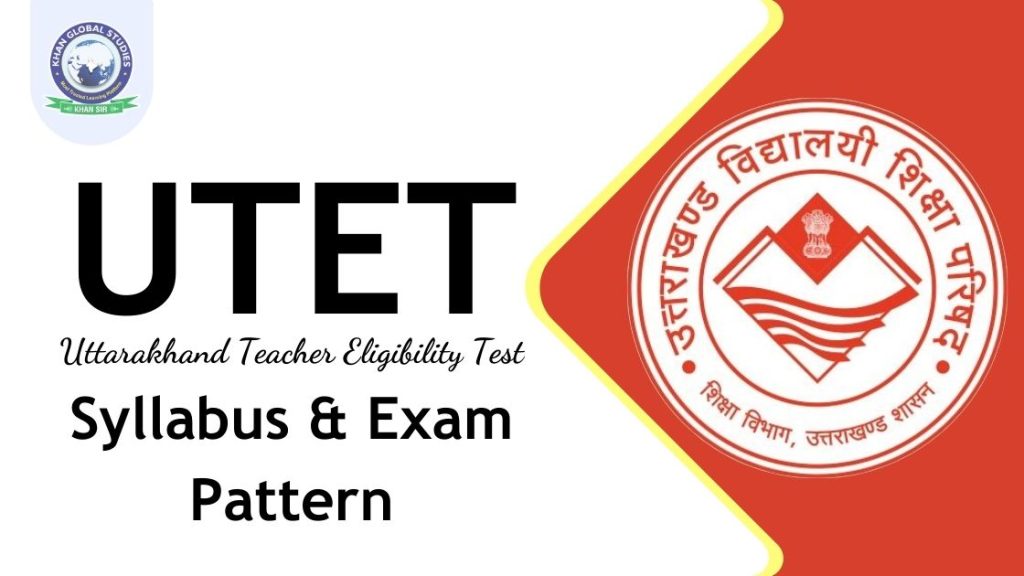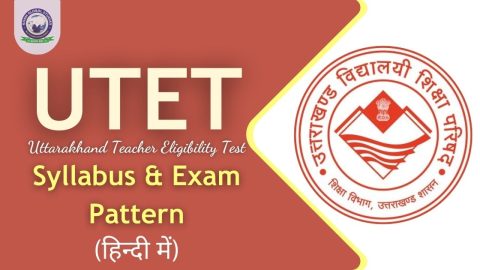The Uttarakhand Board of School Education has released UTET Syllabus 2024. UTET Syllabus will consist of two papers i.e. Paper I and II, where the questions in the UTET exam will be based on the important chapters and their topics prescribed in the UTET Syllabus 2024. Candidates are advised to prepare as per the important topics asked in the UTET exam. Here we are providing the UTET syllabus and exam pattern to help the candidates in their preparation.
UTET Exam Overview
| Conducting Body | Uttarakhand Board of Secondary Education |
| Exam Name | UTET (Uttarakhand Teacher Eligibility Test) |
| Mode of Exam | Offline |
| Exam Time Duration | 2 Hours 30 Minutes (150 Minutes) |
| Question Types | Objective (MCQs) |
| Marking Scheme | +1 for each right answer |
| Negative Marking | No Negative Marking |
| Language | Hindi/English |
| Selection Process | Written TestPersonal Interview |
| Official Website | https://www.ukutet.com/ |
UTET Syllabus
Uttarakhand Board of Secondary Education (UBSE) has officially announced the UTET on its website. Aspiring teachers should now start preparing for UTET Paper-1, UTET Paper-2 or both. This eligibility test will be conducted for primary-level (Class I-V) and secondary-level (Class VI-VIII) school teachers of the state.
UTET Syllabus for Paper 1
| Subjects | Topics |
| Child Development and Pedagogy | Comprehension, Language skills,Pedagogy of language development,Parts of speech,Active and passive voice,Singular plural,Knowledge of the famous poetry of famous poets,Tenses – Present, Past, Future |
| Language-I (Hindi) | भाषा की समझ, कवियों और लेखकों के कार्य, हिंदी वर्णमाला (स्वर, व्यंजन), वाक्य निर्माण, त्रुटि पहचान/वाक्य सुधार, मुहावरे और वाक्यांश, सभी ध्वनियों के बीच अंतर, वर्ण, अनुस्वार, गुंजायमान और चंद्र बिंदु, विराम चिह्नों का उपयोग, संज्ञा, सर्वनाम, क्रिया और सर्वनाम, वाक्यांश, लिंग और काल, भाषा विकास का शिक्षण। भाषा शिक्षणशास्त्र: भाषा शिक्षण विधि, भाषा शिक्षण के उपागम, भाषायी दक्षता का विकास, भाषायी कौशलों का विकास (सुनना, बोलना, पढ़ना, लिखना) शिक्षण अधिगम सामग्री-पाठ्य पुस्तक, बहु-माध्यम एवं शिक्षण के अन्य संसाधन, भाषायी कौशलों का विकास (सुनना, बोलना, पढ़ना, लिखना) शिक्षण अधिगम सामग्री-पाठ्य पुस्तक, बहु-माध्यम एवं शिक्षण के अन्य संसाधन, भाषा शिक्षण में मूल्यांकन, (सुनना, बोलना, पढ़ना, लिखना) उपलब्धि परीक्षण का निर्माण समग्र और सतत मूल्यांकन। |
| Language-II (English) | Comprehension, Language skills, Pedagogy of language development, Parts of speech, Active and passive voice, Singular plural, Knowledge of the famous poetry of famous poets, Tenses – Present, Past, Future |
| Mathematics | Number system, Shapes and geometry, Data handling, Measurements and units, Unitary rule, Percentage, Profit & loss, Simple & compound interest, Measurement, Area & Volume |
| Environmental Studies | Family and friends, Food and nutrition, Shelters, Water, Things we make and do, Plants and animals, Traffic and communication, Sports and sportsmanship, Constitution, Administration |
UTET Syllabus for Paper 2
| Subjects | Topics |
| Child Development and Pedagogy | Child development concept, Learning and pedagogy, Concept of inclusive education and understanding children with special needs, Factors affecting child development |
| Language-I (Hindi) | पर्यायवाची शब्द, विलोम शब्द. शब्द भेद. कारक, संधि, समास, उपसर्ग /प्रत्यय, गद्यांश, मुहावरे /लोकोक्तियाँ, वाक्य शुद्धि, तत्सम /तद्भव, शब्द अर्थ, अनेक शब्द के एक शब्द, वचन, रस /छंद /अलंकार, चिन्ह, वर्णनी त्रुटी, रचना एवं कृतियाँ। भाषा शिक्षणशास्त्र: भाषा शिक्षण विधि, भाषा शिक्षण के उपागम, भाषायी दक्षता का विकास, भाषायी कौशलों का विकास (सुनना, बोलना, पढ़ना, लिखना) शिक्षण अधिगम सामग्री-पाठ्य पुस्तक, बहु-माध्यम एवं शिक्षण के अन्य संसाधन, भाषायी कौशलों का विकास (सुनना, बोलना, पढ़ना, लिखना) शिक्षण अधिगम सामग्री-पाठ्य पुस्तक, बहु-माध्यम एवं शिक्षण के अन्य संसाधन, भाषा शिक्षण में मूल्यांकन, उपलब्धि परीक्षण का निर्माण समग्र और सतत मूल्यांकन। |
| Language-II (English) | Unseen passage and comprehension, Grammar skills, Language pedagogy, Prepositions and its variants, Intersection, Adjectives and its variants, Synonyms and antonyms, Active and passive voice, Suffixes with root words, Negative and interrogative sentences |
| Mathematics and Science | Mathematics: Number system & simplification, Percentage and ratio, Time, Speed and distance, Algebra and mensuration, Geometry, Average, Profit & loss, Pedagogy of Mathematics, Banking. Science: Food & material, Classification of plants and animals, The structure and function of animals, From cell to organ, Natural phenomena and resources, The world of the living, Pedagogy of Science, Sound, Magnetism, Animal nutrition, Carbon and its compounds, Mine and metal |
| Social Science | History, Geography, Civics, Environmental Studies, Home Science, Physical Education and Sports, Music, Horticulture and Fruit Conservation |
UTET Exam Pattern
UTET selection process involves only one stage i.e. written examination. When it comes to the written examination, candidates can opt for one or both or even both of Paper I and Paper II. Here are some extremely important details for the UTET exam pattern that candidates should note:
UTET Exam Pattern for Paper 1
Candidates should be familiar with the revised and detailed exam pattern to prepare a strategy for the upcoming UTET exam. Uttarakhand TET Exam Pattern for Paper 1 is given below.
| Sections | No. of Questions | Maximum Marks | Time Duration |
| Child Development and Pedagogy | 30 | 30 | 2 Hours 30 Minutes (150 Minutes) |
| Language-I (Hindi) | 30 | 30 | |
| Language-II (English) | 30 | 30 | |
| Mathematics | 30 | 30 | |
| Environmental Studies | 30 | 30 | |
| Total | 150 | 150 |
UTET Exam Pattern for Paper 2
Uttarakhand Teacher Eligibility Test (UTET) Paper II is designed for candidates aspiring to teach elementary classes, especially classes VI to VIII. The paper is presented in bilingual format, available in both English and Hindi languages.
| Sections | No. of Questions | Maximum Marks | Time Duration |
| Child Development and Pedagogy | 30 | 30 | 2 Hours 30 Minutes (150 Minutes) |
| Language-I (Hindi) | 30 | 30 | |
| Language-II (English) | 30 | 30 | |
| Mathematics and Science or Social Science | 60 | 60 | |
| Total | 150 | 150 |
UTET Preparation Strategy
Candidates can use the following steps to make a preparation strategy for their UTET exam and improve their chances of selection:
- Candidates should study for 8-10 hours daily to stay on top of their schedule. They can take a day off from studies during the week.
- Candidates should start preparing a few months before the exam, ideally 3 – 4 months.
- Candidates should attempt the previous year’s question papers and time-bound mock tests to develop their time management skills.
- Candidates should refer to online articles, newspapers and magazines to stay updated with current affairs.
- Meditation and regular exercise can also help in improving concentration levels for exams.




